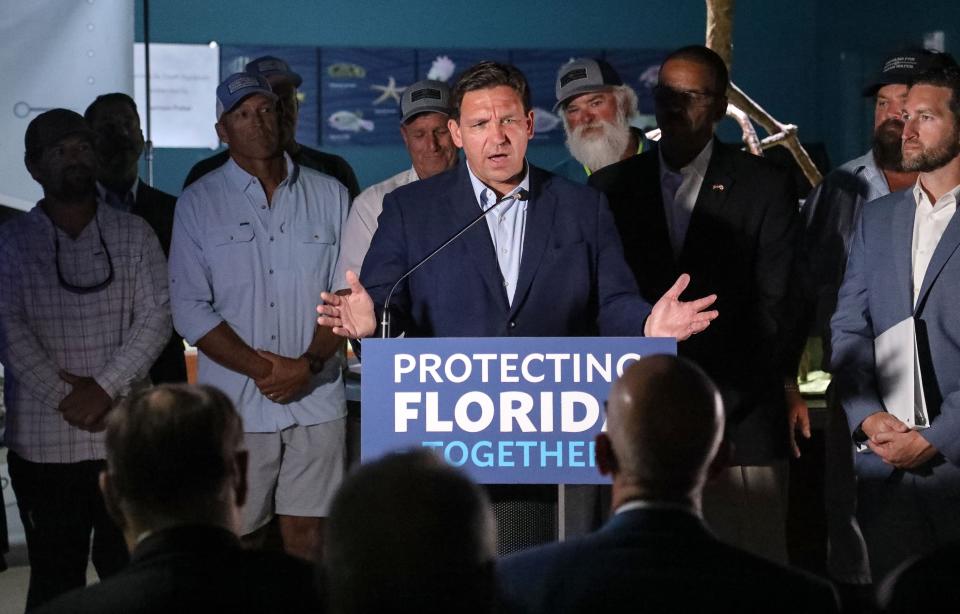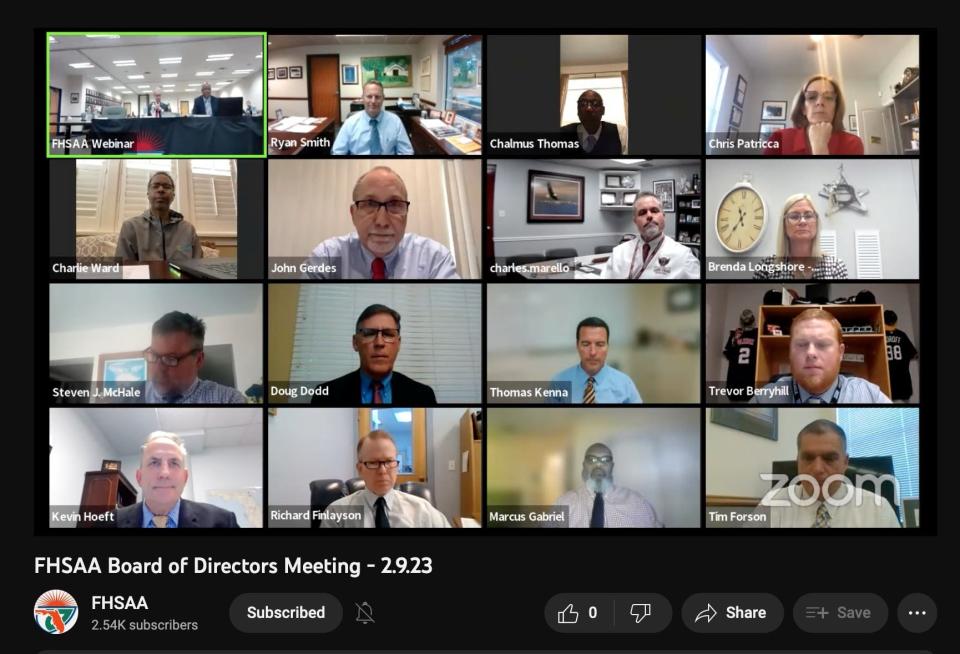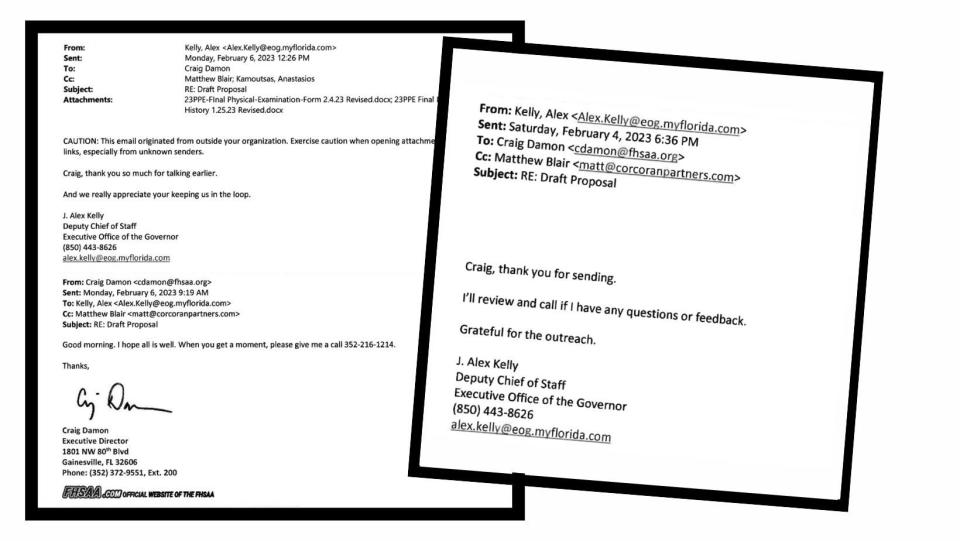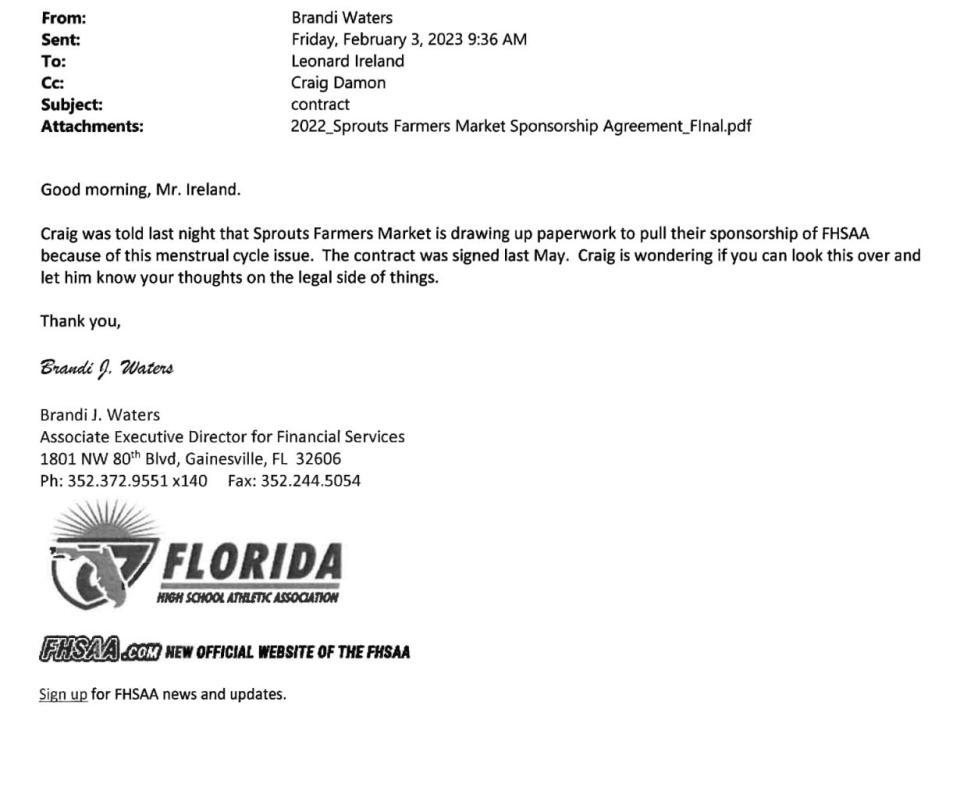EXCLUSIVE: FHSAA removed menstrual questions on form after talking to DeSantis' office
- Oops!Something went wrong.Please try again later.
The Florida High School Athletic Association’s executive director was communicating with Gov. Ron DeSantis’ office less than a week before its board abruptly removed questions about student athletes’ menstrual histories from registration forms, emails obtained by The Palm Beach Post show.
Craig Damon traded emails and phone calls about the FHSAA’s annual registration forms with DeSantis’ deputy chief of staff early on a Saturday morning, Feb. 4. That same day, he removed the questions from a proposed draft of the form, which was the subject of a Palm Beach Post investigation in October that examined the questions in light of the overturning of Roe v. Wade.
Three days later, Damon abruptly announced a special meeting of the board, which had not been scheduled to meet until the end of the month.
At Damon's urging, the board scrapped the questions at that meeting two days later on Feb. 9.
See the timeline of emails: Timeline of emails: What really happened when FHSAA removed menstrual questions?

Pressure was coming from elsewhere, too, the emails show.
Damon learned on Feb. 2 that Sprouts Farmers Market was threatening to pull a $35,000 sponsorship of the FHSAA’s annual state championships in several sports.
Damon also had for weeks been facing a stream of blistering public complaints, more than a dozen media requests for interviews from all over the country and a letter from 29 legislators regarding the organization’s plan to require the menstrual history questions for female athletes.
Despite that pressure, Damon appeared to support the association’s sports medicine committee recommendation to make the five questions mandatory.
But after a call with the governor’s office, Damon called the meeting and reversed course on the issue — calling for the board to scrap the questions.
Post Investigation: Florida asks student athletes about their periods. Why some find it 'shocking' post-Roe
Read more: FHSAA calls emergency meeting to weigh scrapping athlete menstrual history questions
The latest: After Post investigation, federal bill imperils school money if menstrual data is collected
FHSAA director tells staff about 40-minute review of the form by the 'powers to be'
The pressure to remove the questions, which sought answers from female athletes on things such as when they got their first period and how many weeks typically passed between their periods, built between Feb. 4 and Feb. 9, the emails show.
Damon exchanged emails and at least one phone call with Alex Kelly, DeSantis’ deputy chief of staff, who oversees the state Department of Education, starting on Saturday, Feb. 4. The FHSAA is an independent nonprofit that is not overseen by the Department of Education or the governor's office.
Early that day, Damon emailed FHSAA’s associate directors to say he’d just done a 40-minute review of the form with the “powers to (sic) be.” He said he’d eliminated the menstrual questions and “got a thumbs up from their team.”
It’s unclear who the “powers” were. Later that day, Damon emailed Kelly draft proposals of the FHSAA's annual physical examination form for athletes.
Kelly emailed back, saying he’d review it and call with any questions or feedback. Kelly told Damon he was “grateful for the outreach.”
The conversation continued Monday, Feb. 6 when Damon asked Kelly to give him a call and sent Kelly another copy of the form without the menstrual questions included.
Kelly emailed the executive director hours later to thank him for the chat.

DeSantis never publicly weighed in on the menstrual questions for high school athletes, but as a likely contender for the GOP nomination for president in 2024, blame for the questions was pinned on him.
Activists accused DeSantis of personally “wanting teenage girls’ period information” and called the move “disgusting" and “unconstitutional.” Last year, DeSantis signed into law a ban on abortions after 15 weeks gestation. On Thursday, he approved a ban that begins after six weeks.
After The Post published an investigation about the questions in October, the push to remove the menstrual questions became an issue with bipartisan interest that is increasingly rare in Florida. While House Democrats, women’s rights organizations and abortion rights advocates sought more privacy for female athletes, conservatives emailed the FHSAA calling the questions an example of gross government overreach.
An initial appeal to the FHSAA board to remove the questions in November was spearheaded by Ralph Arza, a citizen member of the board and a former Republican legislator. He was backed by Jacob Oliva, then a senior chancellor of the state Department of Education and the board member with the closest ties to DeSantis.
Later, when the FHSAA was pushing toward making the questions mandatory, Florida legislators in January filed the first of two bills that would give DeSantis drastically more power over the way the organization is governed.
H.B. 225 and S.B. 308 would shrink the FHSAA board of directors from 16 members to nine. The bills would also change how board members are chosen: Instead of being elected by FHSAA member schools, eight board members would be appointed by the governor and confirmed by the Senate, and the ninth member would be the state’s top education official.

Despite the communication between Damon and Kelly, it’s unclear what the two men discussed on the phone prior to the board's decision to remove the menstrual questions and to adopt some standardized language that lines up with the national form.
None of the emails between Damon and Kelly mentions the proposed bill that would upend the board’s membership, which awaits a final vote in the House.
The new athlete registration form doesn’t ask about menstrual symptoms but does ask student athletes to list their “sex assigned at birth” instead of their “sex.”
Asked what he discussed with Damon and what the governor’s official stance is on the menstrual questions, Kelly declined to comment.
Instead, Cassie Palelis, press secretary at the Department of Education, responded to questions from The Post.
“The Florida High School Athletic Association is an independent body,” she wrote. “For questions on their decisions, we recommend contacting FHSAA directly.”

Sprouts Farmers Market threatens to pull $35,000 sponsorship
DeSantis’ office may have been the entity closest to the FHSAA with its eye on the menstrual questions, but it wasn’t the only one.
Damon was alerted on Feb. 2 that the Sprouts Farmers Market supermarket chain was “drawing up paperwork to pull their sponsorship of FHSAA because of this menstrual cycle issue,” according to an email sent by FHSAA Associate Director Brandi Waters.

Sprouts hadn't yet paid the $35,000 for the second year of a two-year contract that granted the supermarket chain sponsorship of several state championships.
That afternoon, Damon emailed the FHSAA’s attorney and board Chair John Gerdes asking whether the board should call an emergency meeting to “settle this issue.” It wasn’t clear whether Gerdes knew about the Sprouts contract.
Attorney Leonard Ireland responded an hour later, saying, “I do not believe this came up until Rowe (sic) v. Wade was overruled by the Supreme Court and someone — group? Somehow tied it to abortions.”
Once Damon decided to hold the special meeting, FHSAA leaders appeared relieved to have the chance to salvage the sponsorship, according to their emails.
“I’m hopeful this will help Sprouts make a decision that is favorable for the continuation of our partnership,” associate director Jamie Rohrer wrote Feb. 3 to Damon.

Sprouts Public Relations & Sponsorship Specialist Ashley Lang on April 5 declined to comment on the company’s pressure on the FHSAA.
“At this time, Sprouts continues to be a sponsor of the FHSAA, and we are committed to empowering and educating students and the community about healthy nutrition to live a healthier life, on and off the field,” she wrote in a statement.
Questions about menstrual history had been on the form for 20 years
Optional questions about Florida student athletes’ menstrual histories have been asked on annual registration forms since at least 2002, according to a review of the forms by The Post.
The questions were designed to be discussed between a patient and a doctor when athletes undergo the annual physical examination required to play sports in Florida’s public schools.
Pediatricians say it’s important for physicians to talk to young people about their menstrual cycles because irregular periods can be signs of disorders that put athletes at greater risk for bone fractures or passing out on the field.

It’s important that national medical groups that write physical examination forms recommend a doctor discuss menstrual irregularities with all female athletes.
But until February, Florida athletes were required to turn in the answers to those five questions to their coach, their school’s athletic director and ultimately their school district.
And that’s what worried parents in Palm Beach County, who for the first time last fall used an online platform to turn in the forms where they’d be stored. The summer 2022 overturning of Roe v. Wade sparked new urgency in keeping reproductive information private.
Emails show Damon, a football coach of 20 years near Ocala, an FHSAA employee of nine years and an executive director of just 10 months, knew the issue would be controversial from the start and tried to control the message coming from the FHSAA.
One day after the Oct. 4 publication of The Post’s investigation, Damon emailed the FHSAA board of directors warning them not to return requests for comment from reporters.
He said knowledge of the menstrual questions was “spreading quickly across the state and potentially on a national level.”
Since that email, few members of the board have responded to any questions about the registration form, their voting history or Damon’s about-face on the issue in February that led to the questions’ removal.
Damon did not return requests for comment on his communications with either the governor’s office or Sprouts Farmers Market.
Katherine Kokal is a journalist covering education at The Palm Beach Post. You can reach her at kkokal@pbpost.com. Help support our work: Subscribe today!
This article originally appeared on Palm Beach Post: Menstrual questions: FHSAA spoke to DeSantis' office just before flip

